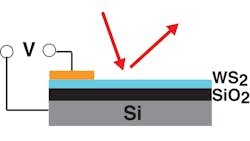Molecular-monolayer structure's refractive index can be tuned electrically through 20% range
Researchers from North Carolina State University (NC State; Raleigh, NC) and Wuhan Institute of Technology (Wuhan, China) have discovered a technique for varying the refractive index of a certain optical material through a large range.1
"With this new discovery, light may be controlled to be strong or weak, spread or focused, pointing one direction or others by an electric field," says Linyou Cao, an assistant professor of materials science and engineering at NC State and corresponding author of the paper on the work.
Controlling light with electric fields is difficult. Photons have no charge, so they do not respond directly to electric fields. Instead, light may be controlled by tuning the refractive index of materials.
"Unfortunately, it is very difficult to tune refractive index with electric fields," Cao says. "Previous techniques could only change the index for visible light by between 0.1% and 1% at the maximum."
Cao and his collaborators have developed a technique that allows them to change the imaginary and real components of refractive index for visible light in some semiconductor materials by 60% and 20%, respectively. The researchers worked with a class of atomically thin semiconductor materials called transition metal dichalcogenide monolayers. Specifically, they worked with thin films of molybdenum sulfide, tungsten sulfide, and tungsten selenide.
"We changed the refractive index by applying charge to 2D semiconductor materials in the same way one would apply charge to transistors in a computer chip," Cao says. "Using this technique, we achieved significant, tunable changes in the index within the red range of the visible spectrum."
These changes are dynamic and can be made billions of times per second. "This technique may provide capabilities to control the amplitude and phase of light pixel by pixel in a way as fast as modern computers," says Yiling Yu, a recent graduate of NC State and lead author of the paper.
"This is only a first step," Cao says. "We think we can optimize the technique to achieve even larger changes in the refractive index. And we also plan to explore whether this could work at other wavelengths in the visual spectrum."
Cao and his team are also looking for industry partners to develop new applications for the discovery.
Source: https://news.ncsu.edu/2017/05/electric-fields-control-light-2017
REFERENCE:
1. Yiling Yu et al., Nano Letters (2017); doi: 10.1021/acs.nanolett.7b00768

John Wallace | Senior Technical Editor (1998-2022)
John Wallace was with Laser Focus World for nearly 25 years, retiring in late June 2022. He obtained a bachelor's degree in mechanical engineering and physics at Rutgers University and a master's in optical engineering at the University of Rochester. Before becoming an editor, John worked as an engineer at RCA, Exxon, Eastman Kodak, and GCA Corporation.
